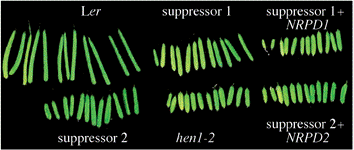Papers in the Biological Sciences

Bin Yu Publications
Document Type
Article
Date of this Version
2012
Citation
Xu, de la Rosa S., Virdi, Arrieta-Montiel, Razvi, Li, Ren, Yu, Alexander, Guo, Feng, Dweikat, Clemente & Mackenzie in Plant Physiology 159 (2012) 710-720 .
Abstract
Multicellular eukaryotes demonstrate nongenetic, heritable phenotypic versatility in their adaptation to environmental changes. This inclusive inheritance is composed of interacting epigenetic, maternal, and environmental factors. Yet-unidentified maternal effects can have a pronounced influence on plant phenotypic adaptation to changing environmental conditions. To explore the control of phenotypy in higher plants, we examined the effect of a single plant nuclear gene on the expression and transmission of phenotypic variability in Arabidopsis (Arabidopsis thaliana). MutS HOMOLOG1 (MSH1) is a plant-specific nuclear gene product that functions in both mitochondria and plastids to maintain genome stability. RNA interference suppression of the gene elicits strikingly similar programmed changes in plant growth pattern in six different plant species, changes subsequently heritable independent of the RNA interference transgene. The altered phenotypes reflect multiple pathways that are known to participate in adaptation, including altered phytohormone effects for dwarfed growth and reduced internode elongation, enhanced branching, reduced stomatal density, altered leaf morphology, delayed flowering, and extended juvenility, with conversion to perennial growth pattern in short days. Some of these effects are partially reversed with the application of gibberellic acid. Genetic hemicomplementation experiments show that this phenotypic plasticity derives from changes in chloroplast state. Our results suggest that suppression of MSH1, which occurs under several forms of abiotic stress, triggers a plastidial response process that involves nongenetic inheritance.


Comments
Copyright © 2012 Xu, de la Rosa S., Virdi, Arrieta-Montiel, Razvi, Li, Ren, Yu, Alexander, Guo, Feng, Dweikat, Clemente & Mackenzie. Used by Permission. Includes supplemental materials.